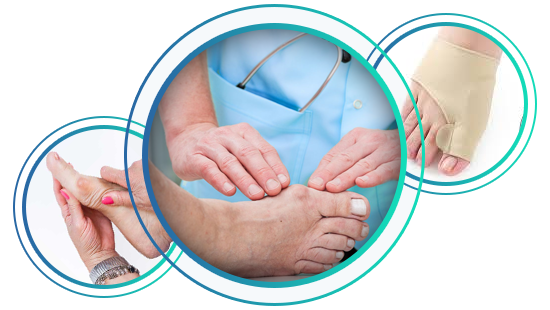
Bunions
Bunions make walking painful and throw your toes out of healthy alignment. Whether your bunion still is just a cosmetic problem or is already causing you pain, Dr. Neil Zwiebel, caring podiatrist at Park East Podiatry in New York, New York, can help. If you live or work in the New York City area, call the friendly Park East Podiatry staff or book a consultation with Dr. Zwiebel online to have your bunions evaluated and treated.
Park East Podiatry offers the most advanced, most effective Bunion Surgery treatments in
Manhattan and throughout NYC. Call us today at 212-207-4360.
Bunions
Frequently Asked Questions & Answers
What causes bunions?
Bunions are caused by a pressure imbalance in your foot that may be genetic or caused by outside sources, such as tight shoes. The pressure on your MTP destabilizes the bones of your big toe, forcing them to move toward your other toes. The metatarsophalangeal joint (MTP joint) is irritated by this process, and gradually enlarges.
Bunions are more common in women than in men, due to the shape of their footwear. High heels, narrow shoes, and shoes that are too tight at the toe all can cause bunions.
Sometimes bunions arise from other conditions that destabilize or irritate your joints, such as arthritis. Congenital foot deformities may cause or contribute to bunions.
What are some bunion symptoms?
The main symptom of a bunion is an enlarged big-toe joint. Other signs or consequences of a bunion include:
- Big toe angles toward, overlaps, or underlaps your other toes
- Red, swollen MTP
- Pain when walking
- Corns or calluses between the compressed toes
- Hammertoes
How can I treat bunions?
Dr. Zwiebel spends time taking an accurate history of your bunion symptoms to determine the underlying cause. He also examines your foot to determine whether your bunions have caused secondary conditions, such as corns and calluses, that may need treatment, too.
Lifestyle-related remedies for bunions include:
- Better-fitting shoes with lower heels and more toe space
- Bunion pads and toe pads to alleviate pressure on the MTP and other toes
- Custom-designed orthotics that reposition and support your toes
- Applying ice or heat to bunion to manage pain and swelling
- Medications that control swelling
If your bunions are large, painful, caused by an underlying deformity, or don’t respond to first-line adjustments, Dr. Zwiebel may recommend bunion surgery.
What happens in bunion surgery?
Dr. Zwiebel performs a bunionectomy in the ambulatory surgical center using local anesthesia. Through a small incision, he cuts the ligaments that are throwing your toe out of joint, and resets the bones to a more anatomical position.
If your bunion is extremely enlarged, he may perform an osteotomy. In this case, he shaves off excess bone and uses wires and screws to reset your toe.
Untreated bunions only get worse. If you have a bunion, contact Dr. Zwiebel. You can use the online form or call his friendly staff at Park East Podiatry.
